Serving 562 students in grades Prekindergarten-8, P.s. 181 ranks in the bottom 50% of all schools in New York for overall test scores (math proficiency is bottom 50%, and reading proficiency is bottom 50%).
The percentage of students achieving proficiency in math is 15% (which is lower than the New York state average of 46%). The percentage of students achieving proficiency in reading/language arts is 29% (which is lower than the New York state average of 49%).
The student:teacher ratio of 11:1 is equal to the New York state level of 11:1.
Minority enrollment is 97% of the student body (majority Black), which is higher than the New York state average of 60% (majority Hispanic and Black).
Quick Stats (2025)
- Grades: Prekindergarten-8
- Enrollment: 562 students
- Student:Teacher Ratio: 11:1
- Minority Enrollment: 97%
- Overall Testing Rank: Bottom 50% in NY
- Math Proficiency: 15% (Btm 50%)
- Reading Proficiency: 29% (Btm 50%)
- Science Proficiency: 30-34% (Btm 50%)
- Source: National Center for Education Statistics (NCES), NY Dept. of Education
School Overview
P.s. 181's student population of 562 students has declined by 12% over five school years.
The teacher population of 50 teachers has grown by 31% over five school years.
Grades Offered
Grades Prekindergarten-8
(offers virtual instruction)
(offers virtual instruction)
Total Students
562 students
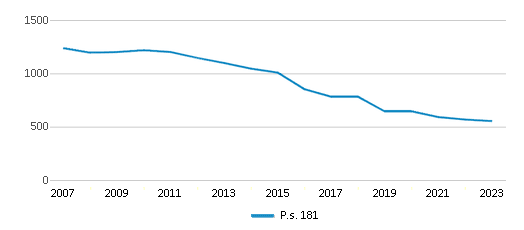
Gender %
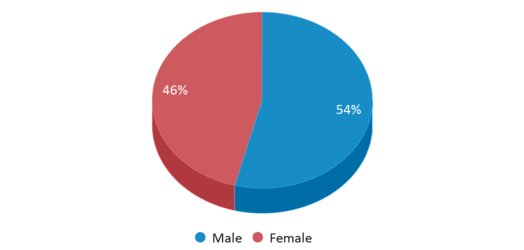
Total Classroom Teachers
50 teachers
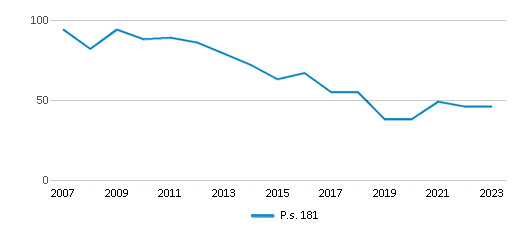
Students by Grade
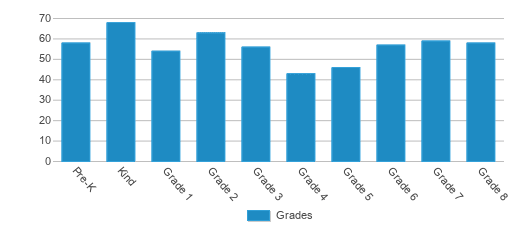
School Rankings
P.s. 181 ranks within the bottom 50% of all 4,377 schools in New York (based off of combined math and reading proficiency testing data).
The diversity score of P.s. 181 is 0.34, which is less than the diversity score at state average of 0.72. The school's diversity has stayed relatively flat over five school years.
Overall Testing Rank
#3917 out of 4377 schools
(Bottom 50%)
(Bottom 50%)
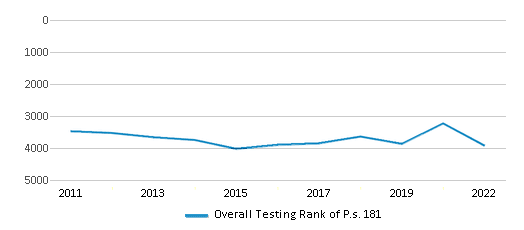
Math Test Scores (% Proficient)
15%
46%
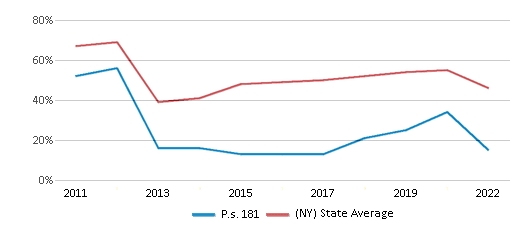
Reading/Language Arts Test Scores (% Proficient)
29%
49%
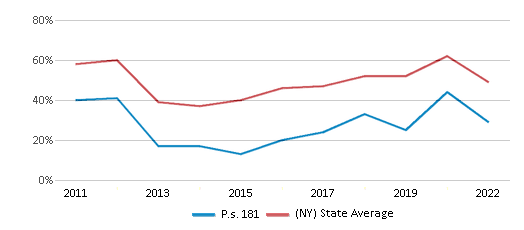
Science Test Scores (% Proficient)
30-34%
78%
Student : Teacher Ratio
11:1
11:1
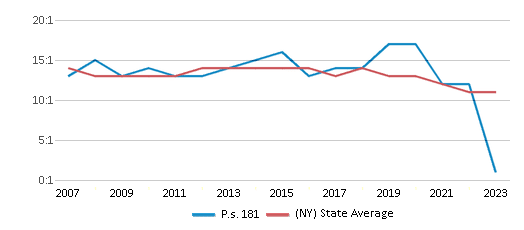
American Indian
2%
1%
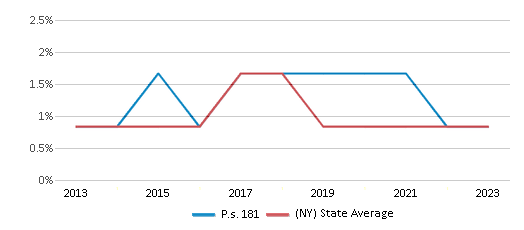
Asian
2%
10%
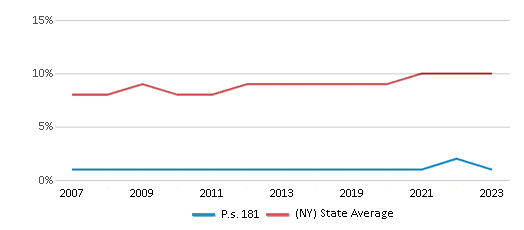
Hispanic
10%
30%
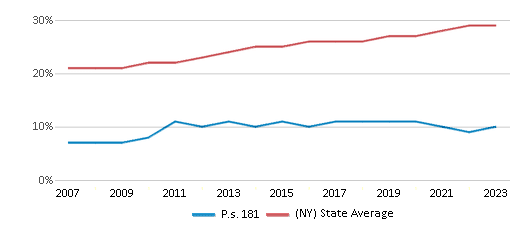
Black
81%
16%
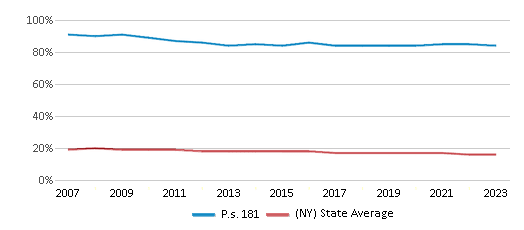
White
3%
40%
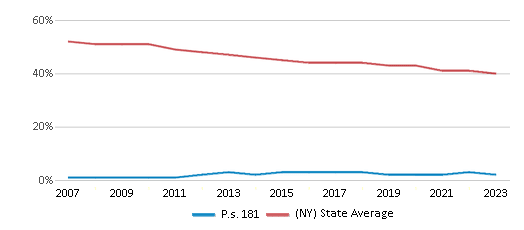
Hawaiian
1%
n/a
Two or more races
1%
3%
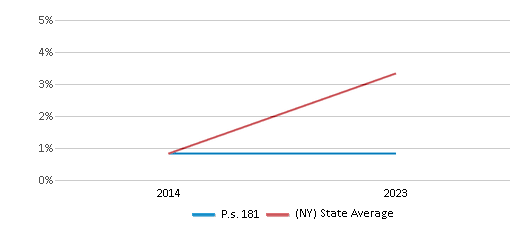
All Ethnic Groups
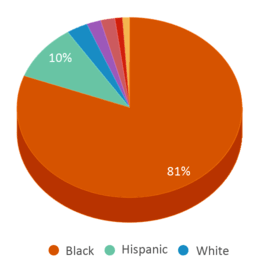
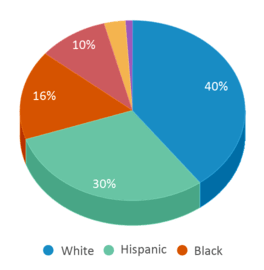
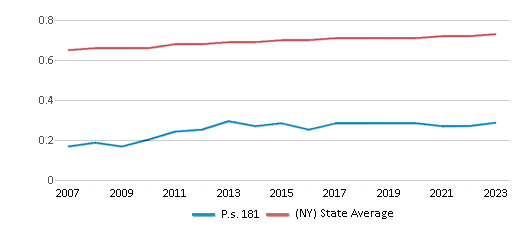
Participates in the National School Lunch Program (NSLP)
Yes
Eligible for Free Lunch
81%
54%
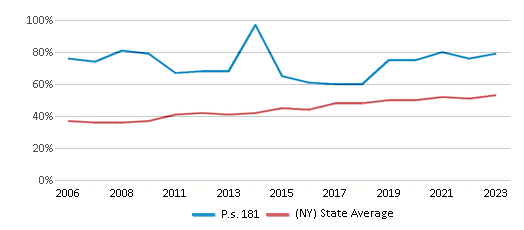
Eligible for Reduced Lunch (21-22)
1%
3%
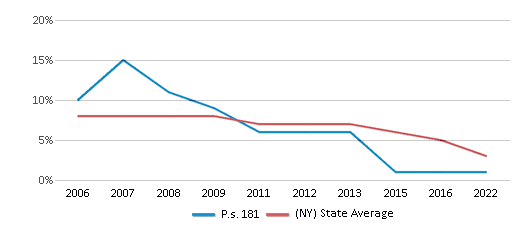
School Statewide Testing
School District Name
Source: National Center for Education Statistics (NCES), NY Dept. of Education
Profile last updated: 02/09/2025
Frequently Asked Questions
What is P.s. 181's ranking?
P.s. 181 is ranked #3917 out of 4,377 schools, which ranks it among the bottom 50% of public schools in New York.
What schools are P.s. 181 often compared to?
P.s. 181is often viewed alongside schools like P.s. 135 Sheldon A Brookner, P.s. 208 Elsa Ebeling by visitors of our site.
What percent of students have achieved state testing proficiency in math and reading?
15% of students have achieved math proficiency (compared to the 46% NY state average), while 29% of students have achieved reading proficiency (compared to the 49% NY state average).
How many students attend P.s. 181?
562 students attend P.s. 181.
What is the racial composition of the student body?
81% of P.s. 181 students are Black, 10% of students are Hispanic, 3% of students are White, 2% of students are American Indian, 2% of students are Asian, 1% of students are Hawaiian, and 1% of students are Two or more races.
What is the student:teacher ratio of P.s. 181?
P.s. 181 has a student ration of 11:1, which is equal to the New York state average of 11:1.
What grades does P.s. 181 offer ?
P.s. 181 offers enrollment in grades Prekindergarten-8 (offers virtual instruction).
What school district is P.s. 181 part of?
P.s. 181 is part of New York City Geographic District #17 School District.
In what neighborhood is P.s. 181 located?
P.s. 181 is located in the Little Haiti neighborhood of Brooklyn, NY. There are 5 other public schools located in Little Haiti.
School Reviews
1 10/15/2020
My children have been attending the school for 4 years and its drama every year. Not only social issues, but academical issues as well. I have so many stories over the years and trust me, it's not worth the headache keeping them there. Very disappointing, try to support your own and it always backfire. Some teachers and staff were amazing and will but miss but the bad outweighs the good. I want to gamble with my children eradication because some staff are nice. I will pull both my kids out of the school 8th and 5th grade and will not be looking back. Research the school's history and read reviews before sending your children.
2 12/27/2018
I went into this school in the 80s and graduated 5th grade, my niece and nephew went and we pull them out. I went to a different middle school than the zone one because my assessment test scored low, same for my niece and nephew. This school performance was low then and now. There is no change. I do not recommend this school for parents who strive for optimal educational success.
5 7/6/2015
i went to this school in the 1950's! I started in grade 1 as my birthday was in March. I remember either was my 1st grade or 2nd grade teacher Mrs. Stelwagon. Not sure if this is spelled correctly. Oh I just loved her. I remember taking the school bus to school. When I reached a certain age I took the trolley. My parents owned a Glass Shop on Church Avenue.
Review P.s. 181. Reviews should be a few sentences in length. Please include any comments on:
- Quality of academic programs, teachers, and facilities
- Availability of music, art, sports and other extracurricular activities
Recent Articles

What Is A Charter School?
Explore the world of charter schools in this comprehensive guide. Learn about their history, how they operate, and the pros and cons of this educational innovation. Discover key facts about charter schools, including admission policies, demographics, and funding, as well as what to look for when considering a charter school for your child.

10 Reasons Why High School Sports Benefit Students
Discover the 10 compelling reasons why high school sports are beneficial for students. This comprehensive article explores how athletics enhance academic performance, foster personal growth, and develop crucial life skills. From improved fitness and time management to leadership development and community representation, learn why participating in high school sports can be a game-changer for students' overall success and well-being.

February 05, 2025
Understanding the U.S. Department of Education: Structure, Impact, and EvolutionWe explore how the Department of Education shapes American education, from its cabinet-level leadership to its impact on millions of students, written for general audiences seeking clarity on this vital institution.









